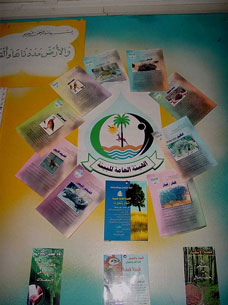|
|
| Home
> Awareness & Education > Libya |
 |
 Awareness
& Education Awareness
& Education |
|
| |
|
|
Libya
In Libya, experts from the Programme participated in a series of national education workshops. The third workshop was held in 2001 at Abu-Ghailan National Park and aimed at presenting results of the work of the Programme to all stakeholders and beneficiaries. The specimens collected from the site, including plant and animal biodiversity, and educational materials (handouts, pamphlets, posters and booklets) were exhibited. The highlights of the workshop were broadcasted on national TV and radio.
Educational and awareness improvement material were produced. They included the production of a videotape on the Abu-Ghailan National Park, which was shown to the participants of the 2001 national workshop. Another videotape dealing with reptiles of the Western Mountain area including the protected areas in question was prepared with supervision and assistance of the programme experts and televised on the National TV station during 1999. Moreover, an educational computer program about Libyan mammals was also produced with the Programme consultants’ supervision and assistance.

Biodiversity conservation issues were introduced into environmental education courses taught to thousands of students of secondary schools.
Small workshops in the women’s training centers were held, during which copies of the Arabic environmental education biodiversity fact-sheets were distributed.
The weekly video-audio programme broadcasted by the Environment General Authority were used to highlight the importance of biodiversity conservation and a seminar on the “Role of NGOs in the protection of the environment in general and biodiversity in particular” was held in recognition of Arab day of the environment (14 October 2000).
Medicinal plants were also used to raise awareness and had an impact locally in promoting a broader interest in conservation. An education workshop about the plants was organized.
Senior and graduate students of the Zoology Department of the Al-Faateh University, along with University personnel, benefited from the experience gained during the Biodiversity Centres and Medicinal Plants Programmes through field work in the sites. They also gained supervised experience to assess and evaluate biodiversity in natural ecosystems of the Mediterranean climate through camping-out field trips.
|
|
|
|
|


